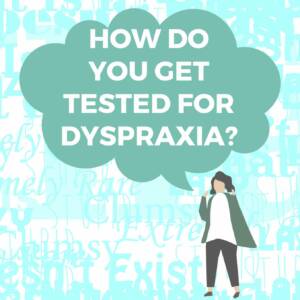
So you think you or your child has Dyspraxia, but how do you get tested for Dyspraxia?
Dyspraxia or Developmental Co-ordination Disorder (DCD) was once called “clumsy child syndrome”. This is because it is a condition that affects physical coordination and people with dyspraxia may appear clumsy. Dyspraxia is more common in boys than girls and it can run in families. Dyspraxic children will become Dyspraxic Adults!!
Children’s development varies widely so whilst a child may present with signs of dyspraxia from an early age they are not normally diagnosed until they are at least 5.
If you think your child could be dyspraxia it is important to speak to your GP and seek a referral for assessment.
If your GP agrees that your child could be dyspraxic they will make a referral to your community paediatrician. The diagnosis will be made by a paediatrician with the help and input from an occupational therapist.
First of all the occupational therapist will go over your Childs medical history. This includes pregnancy and birth and wether they reached developmental milestones. They will also want to know if you have any family history of dyspraxia.
The assessment will include an assessment of your child’s motor skills. This is usually done by an occupational therapist. The occupational therapist will assess:
Gross Motor Skills – the ability to use their large muscles to coordinate movement. This includes walking, jumping and balancing.
Fine Motor Skills – the ability to use their small muscles for accurate coordination such as handwriting, drawing, picking up small objects.
The assessment will usually take place over several appointments and once scored your child will be compared against the normal range of scores for children their age.
A report will then be produced as to whether your child meets the criteria for a diagnosis of dyspraxia or not. If they do get a diagnosis you should be offered follow up appointments with an OT to put exercises and strategies in place.
Co-ordination difficulties can affect everyday life.A child may struggle at school, have difficulties with self-care and struggle to learn to ride a bike. A dyspraxic child will grow into a dyspraxic adult.
Their difficulties will continue to affect them in work, social situations and learning to drive a car. With appropriate treatment and input, dyspraxia can improve for both children and adults.
We hope that this blog has answered your question “How do you get tested for Dyspraxia!”. If you enjoyed this blog, check out our whole collection:
https://blog.chewigem.com/discovering-dyspraxia-5-blogs-to-help-you-spread-dyspraxia-awareness/
If you need more support, why not consider joining your Facebook Sensory Support Group
Sensory Matters Podcast
Free Sensory Support Community
Can Chewigems Help Keep Your Teeth Clean?